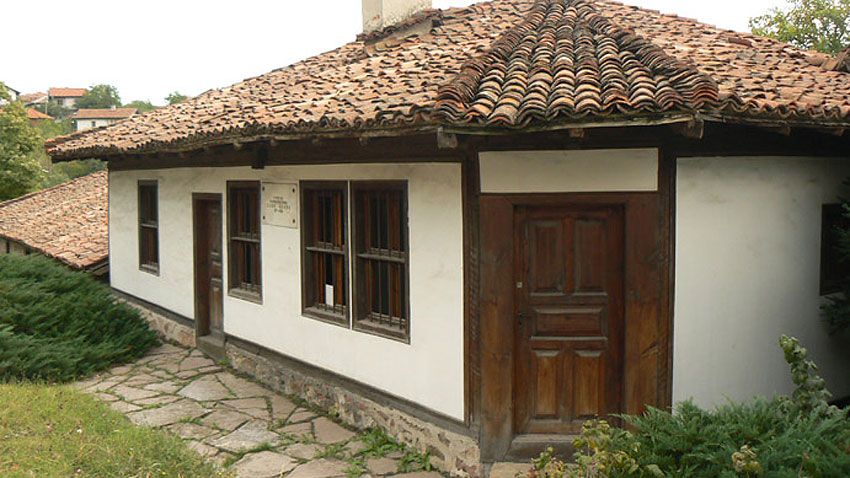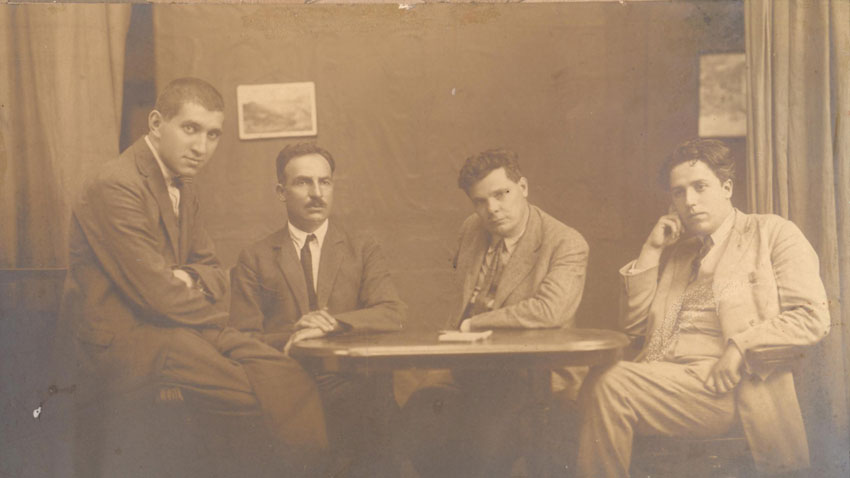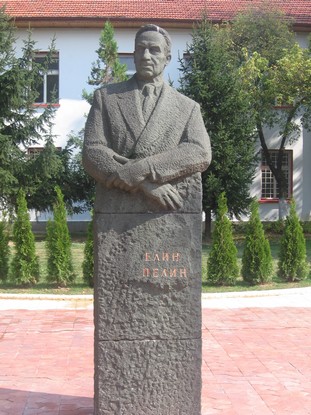Everybody likes a good story: be it a drama or a comedy. Elin Pelin (1877-1949) was a great expert of storytelling, with the rare gift to capture an event, create authentic characters and atmosphere and carry out narration itself in an intensely compelling way with absolutely disarming simplicity though. Here is how very simply he told his own story in a radio address to children made in the 1940s and surviving in the Bulgarian National Radio Golden Archives.
(the audio file contains a voice effect of the great writer)
I was born in the village of Bailovo, /…/ facing the sun straight; a lovely place lying in the very first branches of Sredna Gora Mountain at the point where it moves away from its mother, the Balkan Range, to take a route eastwards. /…/ I was in the fourth grade when I read Under the Yoke by Ivan Vazov. /…/ It was then that I came to love books, the best teachers of mine, and I have not separated from them ever since. Already in secondary school I started writing /…/ At about twenty, I began sending my timidly written short stories to various journals and some of them were printed. Since back at that time it was in the vogue for writers to use pennames, I was looking for one myself. All by chance, I came across the word Elin Pelin in a folk song, and it soon became my second name that fully replaced my real one and threw it into oblivion.

Elin Pelin or Dimitar Ivanov Stoyanov, as was his name of birth, came from a deprived family with many children. In his youth he drew diverse experience from the local mavericks gathering for daily drinking sessions in the pub, speaking the characteristic Shoppe dialect and telling each other rough-and-ready jokes. The young man took a teaching job at his native village, but in 1903 moved to Sofia to earn a living as a writer. This was the time for his great talent and quite remarkable character to show but also for a humiliatingly penniless existence. In the beginning, Elin Pelin earned peanuts, had to wear shabby clothes and shoes, and once even collapsed out of hunger. Despite these trials, he soon emerged as a distinct personality in Sofia’s creative circles: down-to-earth, with a brilliant sense of humor, and with a deep knowledge of the countryside. He was also a good-looking womanizer who waited until 43 to marry, sly, a trifle wild, a jester who went too sour and sarcastic at times. The peasant man with the stubborn dialect survived in his persona throughout his life, although he was a close friend of King Boris III, academic celebrity Alexander Balabanov and famous water-color artist Konstantin Shturkelov.

***
In her celebrated study of Bulgaria’s greatest short story writers, literary analyst Iskra Panova outlines the essential characteristics of Elin Pelin’s narrative. She writes that his stories are “eventful”, or even “mono-eventful”. Each story is firmly positioned around a single event, accident or occurrence.
What kind of events? Various and often stunning: how a peasant gone almost mad with poverty chops off the only lovely thing in his yard, a huge willow tree with twelve stork nests; or a very sick child who dies on a magic mound where sick people went for healing at night… With Elin Pelin, Iskra Panova contends, the event is the focus that dominates and determines the characters, the dialogue and the natural scenery. The happening or occurrence is what drives everything. This structure is responsible for the remarkable brevity of Elin Pelin’s “super” short stories. Panova further adds that he is the great master of the precise, quite expressive and laconic phrase adding great weight to dialogue. The natural scenery is very functional in his works as well, with a range of short stories assembled from two main components only: the scenery and the dialogue. “And it is the way in which the action, the portrait, the dialogue, the scenery and the author’s words all occur that creates this remarkable lightness and simplicity, this rare persuasiveness with which Elin Pelin’s short stories unfold”, concludes Iskra Panova.
Here is next the finale of his short story, Son, translation by Christopher Buxton. The story is about how the son of an old villager suddenly appears in the pub after long years of absence, and loads of bad rumors about the young man – that he might have become a criminal and gone to prison etc. The father is brought to tears of joy but his found son refuses to visit his home, and as the old man goes out into the field to see his son off, the son attacks him to steal his cash.
***
The father opened his cloak and put out his hand to bid farewell.
Suddenly he felt his son’s strong iron hands squeezing his windpipe, and pulling him down to the ground.
A red mist passed across his eyes. His breath stopped. Something heavy pumped at his chest, he wanted to shout but he couldn’t. And then he felt the warmth wrapped around his neck disappear. The cold stabbed at his body, he opened his eyes and realised he was lying in the mud. It was dark. Black impenetrable night had swallowed everything.
The old man rubbed his eyes, wanted to stand up but couldn’t. A frightful thought passed through his head. He felt his chest. His vest was undone and the money had gone.
“If only it’s a dream, only it’s a dream!” he thought, trying to gather his strength to get up, lifted his head and as he levered himself on his hands, he sat up. He felt some terrible weight in his chest. He could hardly breathe. The cold damp revived him. He remembered everything. And he understood everything
“Better if he’d killed me. And now how am I going to carry on!”
Old Nick covered his face with his hands and wept bitter miserable tears.
(Excerpt, translated by Christopher Buxton)
***
 In 1911, Elin Pelin produced his most famous work, The Gerak Family (Geratsite), a novella. It is a classical work in Bulgarian literature and deals with village life amid a most destructive transition from rural simplicity to urban modernization causing a painful collapse of traditional family notions and values. Urbanization is portrayed as a virus, a plague that invades and rots the provincial stronghold of love, understanding and hierarchy with the power of money. His second novella, Earth (Zemya), was released in 1922.
In 1911, Elin Pelin produced his most famous work, The Gerak Family (Geratsite), a novella. It is a classical work in Bulgarian literature and deals with village life amid a most destructive transition from rural simplicity to urban modernization causing a painful collapse of traditional family notions and values. Urbanization is portrayed as a virus, a plague that invades and rots the provincial stronghold of love, understanding and hierarchy with the power of money. His second novella, Earth (Zemya), was released in 1922.
In a twist of irony, Elin Pelin’s creative genius peaked all too early, as his writing reached perfection in his 30s. He did not grow much as a writer after that, but still wrote the celebrated children’s fantasy novel in two parts: Yan Bibiyan (1933) and Yan Bibiyan on the Moon (1934), the first of its kind in Bulgaria, and a classic. In 1936 he released the short story volume Under the Monastery Vine, a cycle of philosophical stories and parables displaying in a very fascinating way the author’s hedonistic slant. The cycle mirrors a change in the creative quests of the great Elin Pelin. His earlier prose clearly distinguishes and even polarizes good and evil, sin and virtue, truth and deception, while in the new volume these notions are interconnected penetrating each other in a subtle way. Thus they become strongly relative and thinkable only together, coupled. Sin is needed to make virtue visible.
Until the end of his life in 1949, Elin Pelin gave more time to writing both poetry and prose for children. He had been lucky avoiding communist repressions in the late 1940s, though he had been a bosom friend of King Boris. The communists obviously took him as a writer of the peasantry oppressed by capitalism. Elin Pelin even met with communist leader Georgi Dimitrov who asked him, “How do you do, Elin Pelin! You’re much the same, didn’t get old at all! How old are you?” The writer modestly admitted, “Seventy something”. “Well, no one would tell – you look much younger!” Elin Pelin was quick with a witty remark, “It seems that I am an immature old man!”